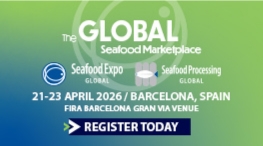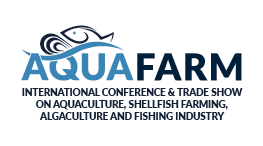Hostilities affect ratio of meat and fish products
Ukraine has always been largely dependent on fish imports, which comprise about 85% of the seafood consumed in the country, and the importers play an important socio-economic role in securing fish and seafood supply. Eurofish spoke to Vasyl Danalaki, CEO of the UkrRiba Group of Companies—one of Ukraine’s largest importers of fish and seafood—who explained how the right balance between trading fish and meat products helps the group sustain the business.
This is the eighth in a series of articles in Eurofish Magazine dedicated to seafood businesses in Ukraine and how they work and survive during the war.
In the late 1990s and at the beginning of the 2000s, Ukrainian consumers preferred cheaper fish, and about 50% of the market comprised herring and mackerel. By 2005 the purchasing power of Ukrainian consumers had increased resulting in the growth of demand for more expensive species such as groundfish and salmonids.
Over 500 products on the list
UkrRiba (UkrFish) was founded in 2005, in the city of Lviv, in western Ukraine, about 70 kilometers from the Polish border. In the beginning, it was a small company that focused on imports and trade in frozen fish. Later, following consumer demand, meat and poultry were added to the range. Over the years UrkRiba has diversified its business adding new activities such as fish and meat processing, transportation, as well as expanding geographically by opening branch offices in different parts of the country.
From a small importer UkrRiba developed into a group of companies involved in purchasing, processing, and logistics. Fish and seafood are sourced from around the world: Argentina, Canada, China, Iceland, Norway, Spain, Uruguay, and beyond. The group focuses on products in the medium-price segments; hake, herring, mackerel, and sprat comprise about 80% of the fish imports, plus other species such as saithe, blue whiting, Alaska pollock, hoki, tilapia, and pangasius. Before the pandemic, the range also included salmonids and roe; however, these imports have stopped, as consumers switched to more affordable “table fish” as it is called locally—fish that are traditionally cooked and consumed at home.
Meat and poultry are imported only when the import prices are better than the local, but this does not happen very often, so the segment is 90% based on domestic supplies, while the remainder is imported mainly from neighbouring Poland—cow and chicken livers, and minced meats.
The array of products includes frozen fish, frozen and fresh/chilled meat and chicken, fish and seafood preserves, salted and smoked fish, meat sausages and canned meat, marinated chicken and chicken cuts, laminaria salad, meat and poultry by-products, and more—over 500 items in total. The UkrRiba group is on the top-10 list of Ukraine’s seafood and meat importers, and on the top-20 list of the country’s largest processors.
By the beginning of the war, the group employed about 300 people and had nine branch offices: Ivano-Frankivsk in the west, Kyiv in the north, Cherkasy and Kropivnitsky in the central part of the country, Odesa in the south, Dnipro, Zaporizhzhiya, and Mariupol in the east. It possessed about 100 refrigerated delivery vans and had around 10,000 m2 of office, production, and storage area in total.
War is nothing but a stick in the wheel
The war affected every facet of the group’s business—imports, production, sales, markets, logistics, and employment. Five of its nine branches were shut down leaving only Lviv, Odesa, Cherkasy, and Dnipro operating. The pool of clients shrank from 1,200 to 800. Many employees fled or were drafted into the army and now the staff amounts to 250 employees where 10% are refugees and about 50 vacancies still wait to be filled. Power outages at storage facilities created a high risk for frozen products in particular. The problems included direct damage: at the beginning of the war, the blast from a Russian missile targeting a nearby airport destroyed the windows of UkrRiba’s processing unit, and in October 2023 a drone fell about 50 meters from the main office and burnt down the group’s warehouse—the fire lasted for three days.

Foreign trade has been negatively affected in many ways. When the port of Odesa was shelled, about 20% of the group’s imports routed through the port were streamed instead through the Lithuanian port of Klaipeda. This hub is now responsible for about 95% of the group’s fish import volumes. Imports were also heavily affected by energy prices and by striking workers at the Polish border. Moreover, the group has about 40 foreign partners worldwide, explains Mr Danalaki, and about half of them are afraid to do business with Ukraine, considering it as non-secure. None of the EU insurance companies will issue insurance certificates for exports to Ukraine.
Helping over 2,000 refugees in the area for months
With the beginning of the invasion, thousands of refugees from different regions of Ukraine escaped to its western areas. It helped that people are very supportive, says Mr Danalaki, – I don’t know any Ukrainians who locked themselves in isolation and did nothing. For several months we supported about 12 schools where the refugees were accommodated—100 to 300 people per school. They all needed food, and we supplied them 300 to 500 kilos of fish for free every day or every second day. Even finding enough drivers was a huge problem and it took us about a month to solve it. I cannot give the exact figures of the total volumes supplied as we didn’t do it for the record.
Currently, UkrRiba has several contracts with the Armed Forces of Ukraine and supplies them, as well as other units involved in defence, with fish, meat, and other products.
Change things you can change, leave the ones you cannot, and distinguish between them
The war plunged everyone into a state of stupor and created numerous problems. Measures—sometimes tough—had to be applied to minimise the losses and to keep the business afloat. First of all, to convince people to return to their jobs or to find new staff and secure their employment and wages. Then, to ensure the power supply by purchasing power generators. But the most crucial was to change the structure of the trade. During the months of war, smiles Mr Danalaki, we have actually switched from UkrFish to UkrMeat. The 60/40 balance between fish and meat has been swapped around.

Thanks to such flexibility, UkrRiba has not lost any of its generic sales volumes, and has even increased them slightly. Its own processing volumes are growing and the group is close to reaching a production of 1,000 tonnes per month. Our strength, explains Mr Danalaki, is in our ability to adapt to the market, to be flexible, and to balance.
Can a war teach anyone anything?
War is very stressful, and crises bring out the best and the worst in people. It is a litmus test showing who is who, says Mr Danalaki. We have learned not to keep all our eggs in one basket—as an example, we now have four smaller storage locations instead of a single large one . We became more conscious about the availability of a reserve power supply in case of an emergency, safety measures, accessibility of fire extinguishers, and dozens of minor things. We were not paying enough attention to these things before the war, but they have become much more important. Such lessons are costly.
When the war ends, dreams Mr Danalaki, I hope people will start spoiling themselves with delicious products, that they will have more celebrations. And most importantly—with a festive feeling, because a celebration without a festive feeling is not a celebration.
Aleksandra Petersen
aleksandra@eurofish.dk









